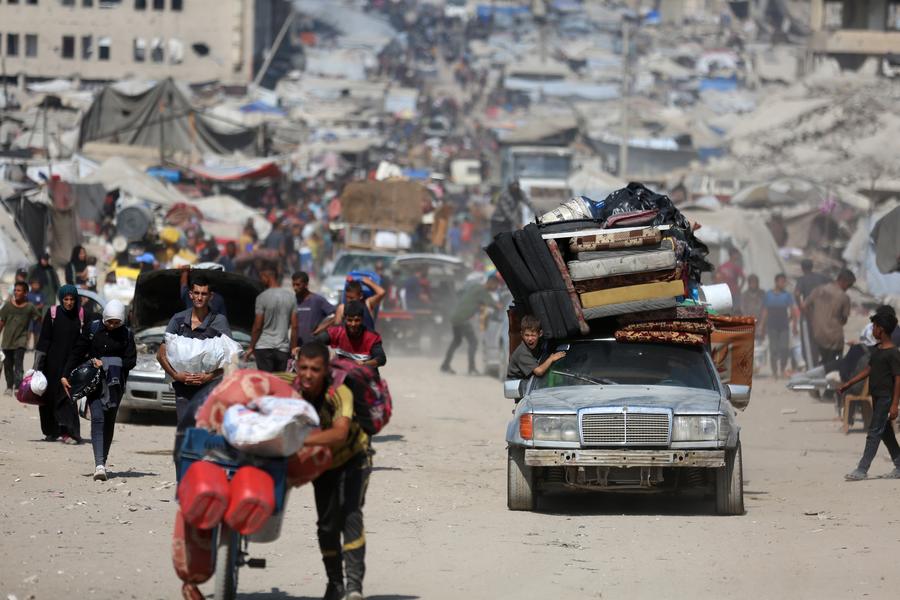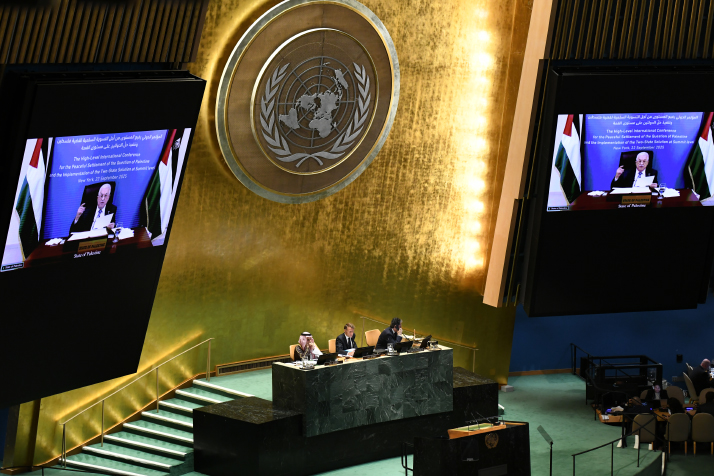Western Recognition of Palestine: Significance & Stances

The vastly differing approaches of the U.S. and China to the Palestinian question highlight a growing divergence in international affairs. China is increasingly seen as a force for peace, progress, stability and good governance, while the U.S. is widely perceived as a force for war, hegemonism, chaos and unilateralism.
In late September, a number of Western countries including Britain, Canada, Australia, France, Portugal, Luxembourg, Malta and Monaco announced their formal recognition of the State of Palestine.
This follows similar announcements by Ireland, Norway and Spain last year, meaning that 157 out of 193 United Nations member states now recognize Palestinian statehood, which was originally declared by the Palestinian Liberation Organization (PLO) in 1988.
That these Western countries, longstanding supporters of Israel, have finally chosen to extend formal recognition to Palestine is a significant development, and reflects the growing international revulsion at Israel’s genocidal assault on Gaza, which has to date resulted in the deaths of at least 65,000 people, the majority of them women and children.
Gaza’s infrastructure has been systematically destroyed, with hospitals, schools, water and power supplies deliberately targeted. A new report by the UN Independent International Commission of Inquiry on the Occupied Palestinian Territory has found that Israel is responsible for the commission of genocide in Gaza. The report continues: “It is clear that there is an intent to destroy the Palestinians in Gaza through acts that meet the criteria set forth in the Genocide Convention.”
International bodies have also confirmed that Israel is deliberately obstructing the entry of food into Gaza and that, as a result, there is an ongoing famine in the territory.
The horrors of this war have shocked public opinion around the world, leading to a powerful global mass solidarity movement which has become too big to ignore. This has prompted governments in the West to reconsider their position on Palestinian statehood.
Significance
Palestinian Ambassador to the United Kingdom, Husam Zomlot, celebrated the announcement of Britain’s recognition, and pointed to its historical significance given Britain’s role in the creation of the state of Israel and the dispossession of the Palestinian people: “In the same capital of the Balfour Declaration, after more than a century of ongoing denial, dispossession and erasure, the UK Government has finally taken the long overdue step of recognizing the state of Palestine.”

Prominent Israeli historian Ilan Pappé, best known for his 2006 book The Ethnic Cleaning of Palestine, commented that recognition of a Palestinian state “has symbolic significance as a counter-movement to the present Israeli strategy of eliminating Palestine as a people, as a nation, as a country, and as a history,” adding: “Any kind of reference—even symbolic—to Palestine as an existing entity right now is a blessing,” as it “prevents Palestine from disappearing from the global and regional conversation.”
Washington isolated
The move by Britain, France, Canada and other Western countries leaves the U.S. increasingly isolated, as the only permanent member of the UN Security Council to oppose Palestinian statehood.
Such is the Trump administration’s hatred of Palestine that it attempted to block President Mahmoud Abbas from attending key UN meetings in New York City by denying visas to him and his team. In the end, a majority of countries voted to allow him to address the session online.
Given that the U.S.’ allies have tended to dutifully follow the foreign policy script written for them in Washington, D.C., it is noteworthy—and welcome—that Canada and the countries of Western Europe are exercising a level of strategic autonomy on this issue. It also highlights that, from a global governance point of view, the U.S. is becoming firmly established in people’s minds as an outlier and destabilizing force in international affairs.
It is to be hoped that these Western countries recognizing Palestine will now place pressure on the U.S., such that meaningful progress can be made at a Security Council level.

China and Palestine
China announced its recognition of the State of Palestine on November 20, 1988, becoming one of the first countries to do so.
From the beginning of the current war, China has called for an immediate, comprehensive and unconditional ceasefire and withdrawal, as well as demanding a resumption of humanitarian aid.
It has urged all parties to negotiate in good faith, and has consistently pointed out that the root cause of the conflict is Israel’s persistent denial of Palestinian national rights.
In February 2024, Ma Xinmin, Legal Adviser to the Chinese Foreign Ministry, made legal representations at the International Court of Justice, upholding the right of the Palestinian people to armed resistance against colonial occupation.
A few months later, hosted by China, representatives of 14 Palestinian factions (including Hamas, Fatah and the Popular Front for the Liberation of Palestine) met in Beijing to end Palestinian national division. Witnessing the signing of the Beijing Declaration on Ending Division and Strengthening Palestinian National Unity on
July 23, 2024, Chinese Foreign Minister Wang Yi remarked that only when Palestinian factions speak as one can the voice of justice be loud and clear, and only when they join hands and march forward shoulder to shoulder can they succeed in their national liberation cause.
Moving forward
The vastly differing approaches of the U.S. and China to the Palestinian question—as well as to the Ukraine war, the Iran nuclear issue, the climate crisis and many other urgent global challenges—highlight a growing divergence in international affairs. China is increasingly seen as a force for peace, progress, stability and good governance, while the U.S. is widely perceived as a force for war, hegemonism, chaos and unilateralism.
While wider recognition of Palestinian statehood represents a victory for Palestinians, it is a largely symbolic step. Gaza is experiencing the worst humanitarian crisis of the 21st century. Illegal settlements are expanding in the West Bank. Self-determination and national rights for Palestinians are still far from being realized.
The peoples of the world must continue to mobilize to demand an immediate ceasefire, an immediate withdrawal of Israeli troops, an end to the siege, a resumption of full humanitarian aid, and the earliest possible UN-level dialogue toward a just and lasting peace and the realization of the legitimate national rights of the Palestinian people.
The author is an activist, writer and independent political commentator based in London. He is also author of The End of the Beginning: Lessons of the Soviet Collapse (2019) and The East Is Still Red: Chinese Socialism in the 21st Century (2023).
 Facebook
Facebook
 Twitter
Twitter
 Linkedin
Linkedin
 Google +
Google +










